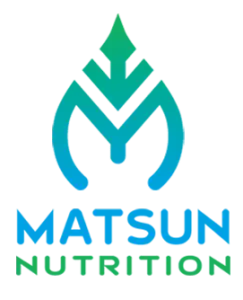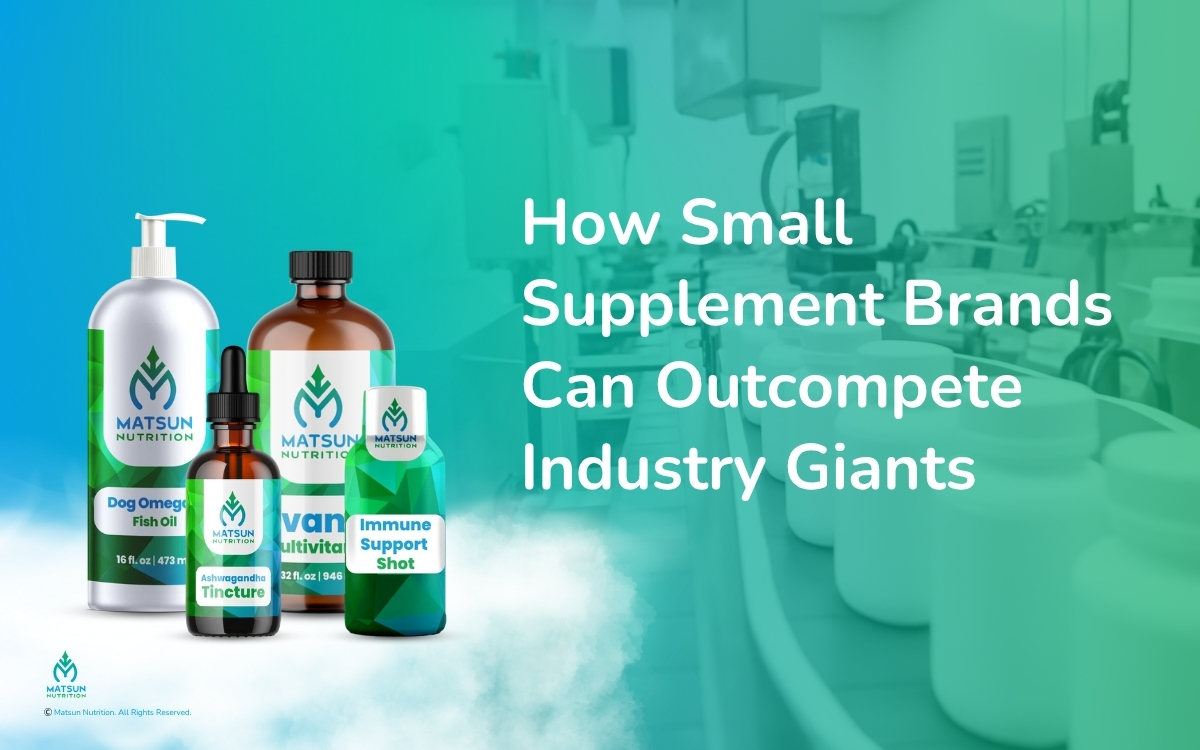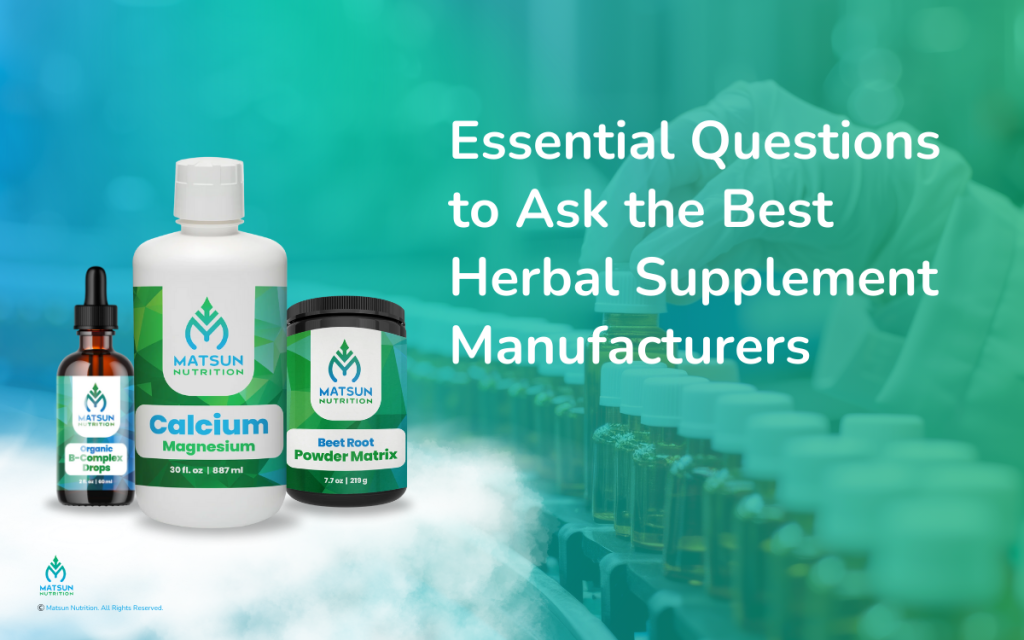The supplement industry has an interesting pattern: garage operations can become eight-figure businesses while well-funded companies with great connections crash and burn.
The difference isn’t money or connections, it’s something most people completely miss.
The big players aren’t dominating the compete supplement industry; they’re breaking it apart. When massive companies create a basic multivitamin, they’re not trying to make the perfect product for you. They play it safe, water everything down, and lose sight of who they’re helping.
This creates what I call “the opportunity canyon”—massive gaps between what large companies offer and what specific groups need. That’s where small supplement brands crush it.
Take this example: most recovery supplements target 25-year-old male athletes, but the fastest-growing fitness demographic is women over 40. Small supplement brands that created a recovery formula specifically for this group, addressing hormonal changes and lifestyle factors nobody else considered, hit $3 million annually within two years in a space that “didn’t exist” according to the big players in the compete supplement industry.
Understanding Your Niche for Market Dominance
The riches are in the niches, but most people pick the wrong niches when developing small supplement business strategies.
They go after “athletes,” or “women’s health,” or “seniors”—categories that are still way too broad. Successful brands go three levels deeper. Instead of “athletes,” they target “endurance athletes who train in hot climates.” Instead of “women’s health,” they focus on “working mothers dealing with perimenopause fatigue.”
This is known as the “dinner party test.” If you can’t describe your ideal customer so specifically that someone at a dinner party would say, “Oh, that’s exactly like my neighbor Sarah,” then you’re not narrow enough yet.
Start with Reddit and Facebook groups, but don’t just read the obvious posts. Look for the comments where people are describing workarounds, sharing hacks, or saying things like “I wish someone made…” Those comments are gold mines.
This approach exemplifies that small supplement business strategies should focus on solving real, specific problems rather than competing on generic benefits.
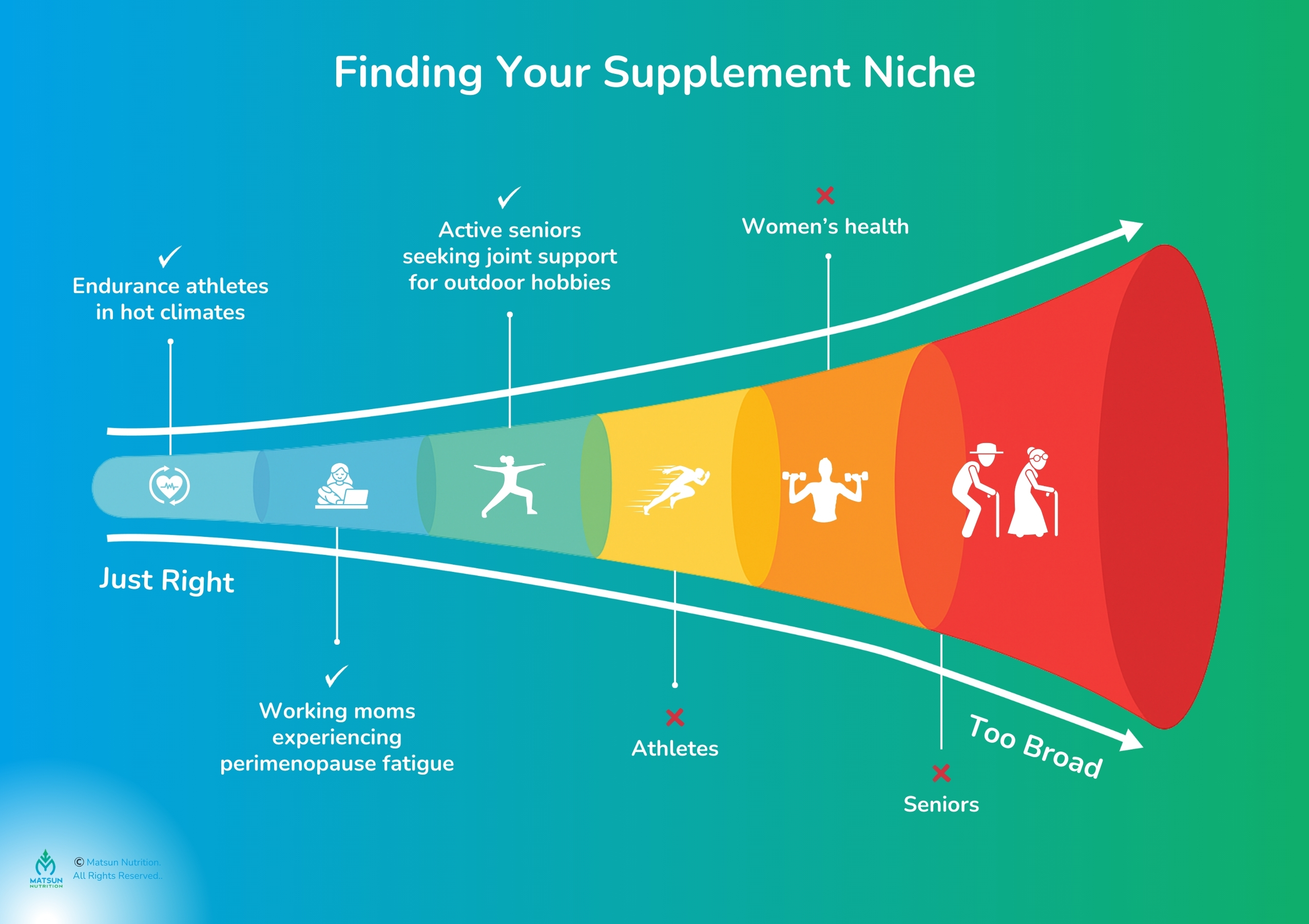
Agile Manufacturing: The Small Brand Advantage
Here’s the thing about the supplement industry that most people don’t realize – the big companies are basically stuck in the past. They’ve got these massive operations with contracts and processes that take forever to change anything, while smaller brands can pivot and adapt way faster.
I’ve heard stories of major brands taking over a year just to swap out one ingredient because of all their internal red tape and existing inventory. Meanwhile, a nimble brand can listen to customer feedback, reformulate, and get something new to market in a couple of months.
But here’s where a lot of small brands mess up – they think being fast and flexible means going cheap. That’s backwards thinking. Being agile means being smart about your choices.
The best supplements manufacturers for small brands aren’t necessarily the cheapest ones; they’re the ones who get that your first version probably won’t be your final version. They can handle custom requests, weird ingredient combos, and unusual formats that the big facilities won’t even consider.
Smart brands budget for multiple rounds of their initial products, not because they expect to fail, but because they know they’re going to learn stuff about their customers that’ll make the product even better.
The real game-changer is finding manufacturers who actually care about your success instead of just treating you like another order to fill. Those relationships become incredibly valuable as you grow.
Building a Strong, Authentic Brand Identity
Being authentic doesn’t mean you need some perfect origin story or that you never make mistakes. People just want you to be straight with them about who you are, how you operate, and what you stand for. The small supplement brands that stick around aren’t trying to be the next Amazon of wellness – they know exactly who they’re for.
When you’re building a supplement brand from scratch, the key is figuring out what makes your approach different and being able to explain it in simple terms. If you can’t describe why your brand exists in a way that makes immediate sense to someone, you’re probably overcomplicating it. Simplicity wins. Your value prop should be clear enough that a first-time visitor or potential partner instantly gets it.
But here’s where a lot of people mess up: they think having a clear why is enough. It’s not. You still need to know what you’re talking about, stay current with what’s happening in your space, and be able to communicate about it in ways people can understand.
The brands that work long-term find their niche and become genuinely helpful to those specific people. When you get that right, everything else tends to fall into place.
RELATED READ:
Leveraging Digital Marketing on a Budget
The whole marketing game has flipped in the last five years, and honestly? It’s been a massive win for small supplement brands. Traditional channels like print ads, radio, and even Google Ads often come down to who can spend the most. But the platforms driving real results today reward brands that know what they’re talking about and aren’t afraid to prove it.
RELATED READ:
USA vs Global Supplement Manufacturers: Where to Source Your Ingredients?
If you’re looking for marketing tips for supplement startups, start with content. Real content. Not fluff. Effective supplement branding isn’t just about a sleek label or a clever tagline; it’s about becoming the go-to source when your audience feels overwhelmed or unsure. The brands that win aren’t the loudest, they’re the most helpful.
I’ve watched tiny brands completely outrank giants on Google just by offering more specific, trustworthy content around niche topics. That’s supplement brand differentiation in action. You don’t have to outspend your competition if you can out-educate them.
Think of a content strategy like this: Stop talking about your product all day. Start solving real problems. Teach people how to decode complicated supplement labels. Break down ingredient science in plain English. Help them understand what works and why. This is the kind of content that builds trust, and trust leads to online sales for small supplement brands.
And when it comes to customer stories, skip the clickbait. No one believes “I lost 20 pounds in 30 days!” anymore. Tell the full journey, the doubts, the missteps, the small wins along the way. People relate to the mess, not just the result.
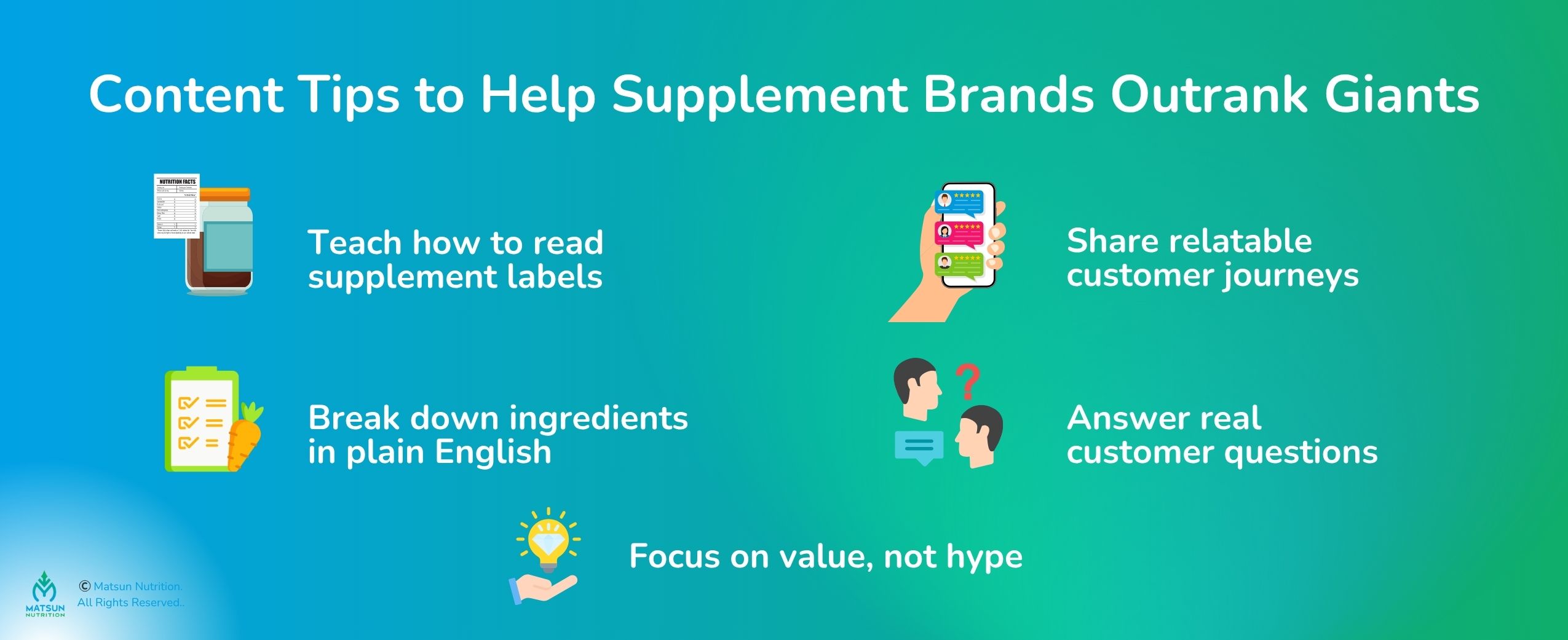
Quality Control: Your Undeniable Competitive Edge
With agile supplement manufacturing, quality control is where small brands can establish credibility that big companies often can’t match. It’s not that big companies don’t care about quality (they do), but their scale often makes certain quality measures impractical. Smaller, more agile operations can adapt quickly, implement tighter controls, and build trust through transparency.
I’ve developed what I call the “quality triangle” for small supplement brands: transparency, testing, and traceability.
Transparency means being open about your ingredients, suppliers, and manufacturing processes. Share your lab results. Explain why you chose specific ingredients. Show certificates of analysis. Most big brands won’t do this because it reveals too much about their supply chain and margins.
If you’re trying to sell supplements on Amazon or scale through any serious retail channel, testing can’t just be a box you check. Third-party labs should be confirming potency, purity, and contamination levels as a baseline. But if you’re serious about standing out, take it further, test for heavy metals, pesticides, and allergens. It’s not just about safety. It’s about showing your customers that you genuinely care about what goes into their bodies.
This kind of commitment is what separates you from the pack. Quality control for small supplement brands isn’t optional; it’s your competitive edge. When you show full transparency and can trace every ingredient back to its source, people notice. Sure, regulations require it, but that’s not the point. It’s the trust that matters. Being able to back up your claims with real data is a core part of any strong, unique selling proposition for supplements.
And yes, it has a cost. You should plan to spend 15–20% of your product cost on quality control. That may sound painful, especially when you’re scaling a small supplement company, but it’s the best insurance policy you’ll ever invest in. One bad batch, one wave of negative reviews, or one regulatory issue can take down everything you’ve built.
In a crowded market, especially when trying to sell supplements on Amazon, your reputation is everything. Quality and transparency are how you earn it and keep it.
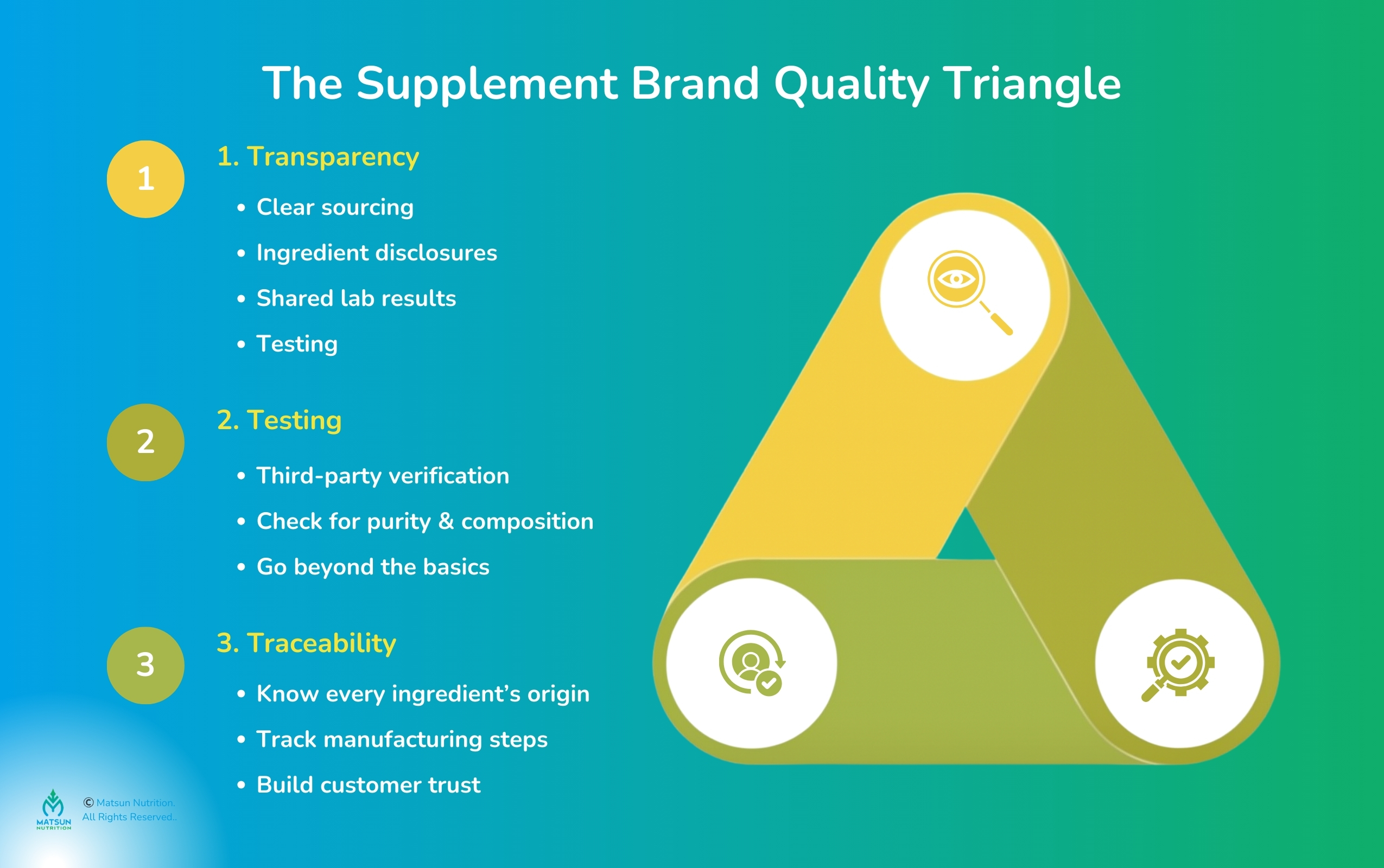
Customer Loyalty: Turning Buyers into Advocates
The customer acquisition cost for supplement brands has increased by 60% in the past five years. The brands that thrive are those that turn one-time buyers into lifelong customers and vocal advocates.
Customer loyalty in the supplement industry is different from other industries because results take time. People don’t know if your product works after one use; they need to trust you enough to stick with it for weeks or months.
This is where small brands have a massive advantage. You can provide personal attention, follow-up care, and ongoing support that big companies can’t match at scale.
The key is making customers feel like they’re part of a community, not just another transaction. Create spaces where customers can share their experiences, ask questions, and support each other.
Innovation: Staying Ahead of Industry Trends
The supplement world moves fast, and the real magic happens where new science meets shifting consumer needs and evolving regulations. While big companies are still figuring out what’s next, nimble brands can swoop in and own these emerging spaces.
You should be constantly diving into research papers, hitting up industry events, and picking the brains of formulators about what’s coming down the pipeline. All that intel? It becomes the blueprint for where we should be heading with new products.
Right now, I’m seeing some pretty exciting opportunities that smaller brands can capitalize on:
Take personalized nutrition – we’ve got the tech to create supplements based on someone’s actual DNA and biomarkers, but most companies are still churning out generic formulas for everyone. There’s a massive gap there.
Then there’s the whole microbiome space. Everyone’s doing basic probiotics, but there’s so much more we can do to target specific gut issues that people are dealing with.
Adaptogens are having a moment, too, and for good reason. People are burned out and looking for natural ways to handle stress and perform better in this crazy world we’re living in.
And you can’t ignore the sustainability angle. Consumers care about where their ingredients come from and how they’re sourced.
But here’s the thing: it’s not about chasing what’s hot now. You have to understand why people want what they want. Nobody’s buying adaptogenic mushrooms just because they saw them on Instagram. They’re buying them because they’re genuinely stressed and desperate for something that works.
Strategic Partnerships for Scalable Growth
Private label supplement success often comes down to choosing the right partners. Partnerships can be a game-changer for growth, but only if you’re strategic about them. I’ve seen too many small brands say yes to anyone willing to work with them, without considering whether that partner aligns with their audience or values. Such short-term thinking can stall long-term growth.
When you’re competing with large supplement companies, the right partnerships can give you a real edge, but only if they’re built strategically. For comprehensive support that spans everything from low minimum order quantities to expert private label and custom supplement manufacturing solutions, consider a partner like Matsun Nutrition. They even guide your path to selling supplements on Amazon, ensuring seamless market entry and growth. Compatibility matters more than promises.
And if you’re thinking about influencer partnerships, be extra careful because of all the regulations around health claims. Stick with people who focus on educating their audience rather than posting dramatic transformation photos that’ll get you in trouble with the FDA.
Navigating Compliance Without the Headaches
Regulatory compliance in the supplement industry is like playing chess while the rules keep changing. It’s complex, but it’s also an opportunity to differentiate yourself from competitors who cut corners.
The FDA’s regulations around supplement labeling and marketing claims are designed to protect consumers from misleading information. Understanding these rules allows you to communicate effectively while staying compliant.
Structure/function claims (what your product does) are allowed. Disease claims (what your product treats) are not. The difference matters, and getting it right from the beginning saves expensive corrections later.
Documentation is your friend. Keep records of everything: ingredient certificates, lab results, customer communications, and marketing materials. If you ever face regulatory scrutiny, thorough documentation demonstrates your commitment to compliance.
Funding Your Growth: Smart Financial Strategies
Managing cash flow in the supplement world is honestly pretty brutal. Everything about this industry works against you. You’re ordering inventory months in advance, dealing with wild seasonal swings, and somehow expected to keep growing while keeping enough product on hand. Low MOQ supplement production can help ease that pressure by letting you scale inventory more gradually and reduce the upfront risk.
Traditional banks basically have no clue what we do, so getting a regular business loan is like pulling teeth. That’s why more supplement brands are turning to revenue-based financing or alternative lenders who understand e-commerce and don’t freak out when you explain how the business works.
Keep at least six months of operating expenses sitting in the bank, because this industry will throw curveballs at you constantly. Supply chain gets messed up, regulations change overnight, or suddenly everyone wants your sleep supplement in January but ignores it in July, you need that cushion to survive the chaos.
The brands make it long-term? They focus on being profitable from day one instead of chasing growth at any cost. They know exactly how much it costs to acquire a customer, how much that customer is worth over time, and they make decisions based on numbers that make sense instead of just hoping things work out.
Optimizing Your Supply Chain for Efficiency
Supply chain optimization for small supplement brands is about resilience, not just efficiency. You need systems that can handle growth while maintaining quality and managing costs.
Diversification is key. Don’t rely on a single supplier for critical ingredients. Build relationships with multiple suppliers, even if it means paying slightly higher prices. Supply chain disruptions can kill a small business faster than anything.
Technology solutions for inventory management have become much more accessible and affordable. Simple software that tracks inventory levels, reorder points, and lead times can prevent stockouts and reduce carrying costs.
Communication with suppliers becomes even more important when you’re small. Regular check-ins, advance notice of demand changes, and clear expectations help ensure smooth operations.
Summary
The supplement industry is changing fast. People know more than before. They’re pickier about what they buy. And they’ll pay more for stuff that really works for them. This is huge for small brands. You don’t have to compete on price anymore if you can deliver real value.
Being small isn’t holding you back; it’s your biggest advantage. You can change direction quickly. You can actually care about individual customers. You can focus on specific groups of people in ways that big companies just can’t.
The brands that are going to win over the next ten years? They’ll know their stuff inside and out. They’ll listen to what customers need. And they’ll be run by people who get that this isn’t just about making products.
The question isn’t whether there’s room for your supplement brand in this market. The question is whether you’re ready to claim your piece of it. Ready to turn your supplement vision into reality? Get your custom manufacturing quote and let’s discuss how to build something that matters.
Frequently Asked Questions
How do small supplement brands gain trust?
The brands that earn trust do it by being completely transparent. Posting lab reports, explaining ingredient sourcing, being honest about what their products can and can’t do, and then actually following up with customers to see how they’re doing. You can’t manufacture trust with fancy marketing; it only comes from consistently showing up and genuinely caring about the people using your products.
What is a good MOQ for supplement startups?
We’ve seen too many entrepreneurs blow their entire budget on their first order because they got excited about “better pricing” on 10,000 units. Don’t do that. Start with 500-2,000 units max. Your per-unit cost will be higher, but you’ll be able to afford your second order when you need to make improvements. And trust me, you will need to improve. You’d much rather sell out and have to wait two weeks for new inventory than have 8,000 bottles collecting dust in your closet.
Can small brands afford quality manufacturing?
This is where people get confused; they think quality means expensive. It doesn’t. It means finding manufacturers who care about small brands. The big facilities don’t want to deal with your 1,000-unit orders, but there are plenty of smaller operations that specialize in working with startups. Yes, you’ll pay more per unit, but you’ll get better service, more flexibility, and actual quality control.
How to market supplements with a limited budget?
Don’t even think about trying to outspend the big companies on ads. You’ll burn through your budget and have nothing to show for it. Instead, become the go-to person in your space by actually helping people. Write useful content, jump into Facebook groups to answer questions, make videos that break down the confusing stuff nobody else explains. When people trust you as their reliable source of information, recommendations and word-of-mouth marketing happen naturally.
Do small supplement brands need FDA approval?
No, supplements don’t need pre-approval like drugs do. But, you still have to follow FDA rules about what you can say and how you make your products. You can’t claim your supplement treats or cures anything. You can say it “supports” normal functions, but be careful with your wording.
What makes a supplement brand stand out?
Stop trying to be everything to everyone. The brands that take off are obsessively focused on solving one specific problem for one specific group of people. Big companies can’t do this because they need mass appeal. You don’t. Find your people, understand their exact problem, and solve it better than anyone else.
How long does it take to launch a small brand?
If you know what you’re doing and don’t get sidetracked, about 3-6 months from idea to first sale. Most people underestimate complexity and rush to market. Bad idea. Take the time to get your formulation right, your compliance sorted, and your messaging dialed in. It’s much easier to launch correctly than to fix problems while you’re trying to sell products.
Should small brands focus on one product?
Yes. Many entrepreneurs want to launch with five different products because they think it makes them more legitimate. All it does is spread your attention, confuse your customers, and drain your budget. Perfect one product first. Get to know your customers, understand what they need, and build a reputation for excellence. Once you’ve got that foundation, then you can think about expanding your line based on what your customers are asking for.
